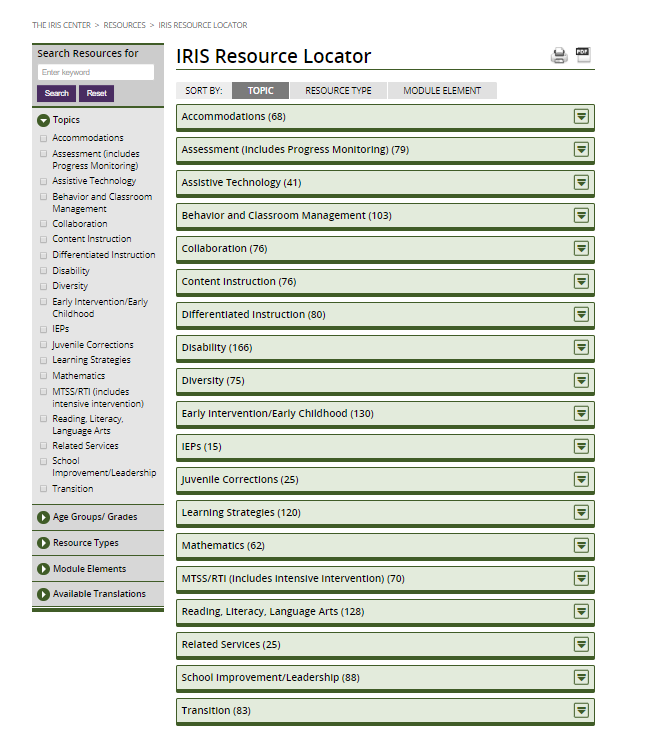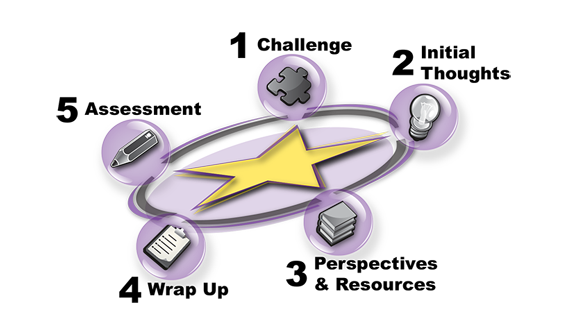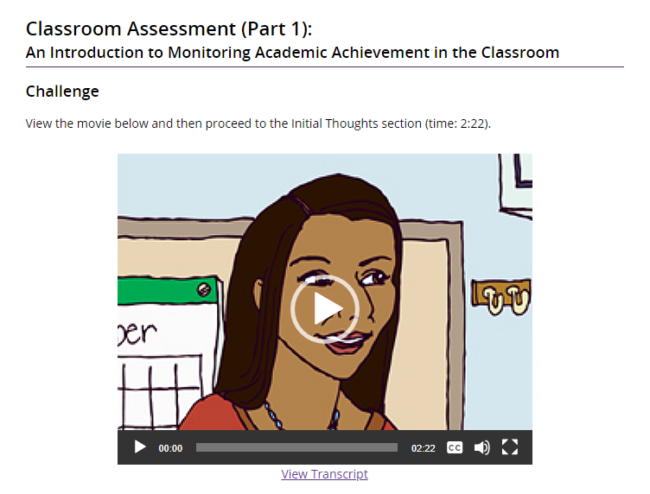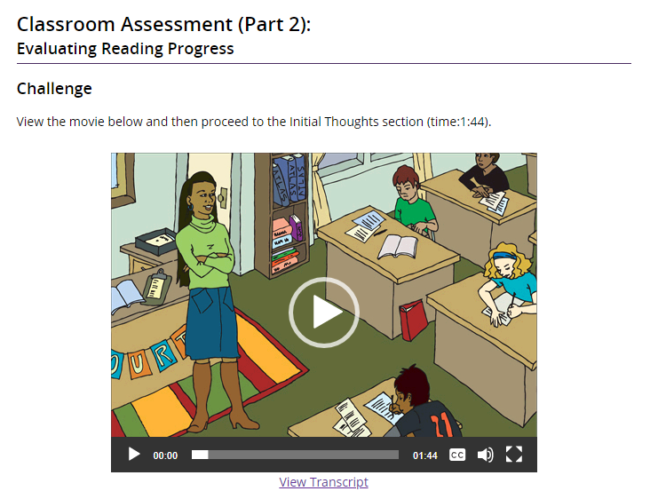Iris Center at Vanderbilt University – CBM

What is the Iris Center? “The IRIS Center offers high-quality online, open educational resources (OERs) that translate research to practice for use in personnel preparation and ongoing professional development so that educators have the knowledge and skills they need to use evidence-based practices to improve outcomes for all students, especially struggling learners and those with disabilities. (Iris Center, 2019).”
Click here to access the Iris Centers Information Brochure.
The Iris Center at Vanderbilt University offers a wide variety of professional development for teachers, administrators and those in the education field. The modules are created by leaders in the field and are backed by research. Each professional development module includes a course with step-by-step training, videos and case studies on a variety of topics.
Here are a the topics that the Iris Center has created high-quality modules for:

(Source: Iris Center, 2019)
The modules that we will focus on for this page, are the two modules, that the Iris Center created for Curriculum-Based Measurement. Located below is information on each of the modules and links to access the resources.
The modules are set up in five parts:

(Source: Iris Center, 2019)
- Challenge – Begins the module with what will be discussed and covered in the module.
- Initial Thoughts – Asks questions about what you know about the topic being covered
- Perspective and Resources – Provides objectives for the modules and connections to professional learning standards – CEC, InTasc, CAEP, NCATE
- Wrap-Up – Summarizes the information from the module and has a section to revise your initial thoughts with the new information required from the module
- Assessment – Provides an assessment to both identify the knowledge you gained from the module and an application based question to apply your new knowledge
If you would like to take one of the modules, all you have to do is sign up for a free account. You can also get access to professional development certificates that can be used for professional development credits for your district.
Let’s look at these modules:

(Source: Iris Center, 2019)
Description of the Module: “This module discusses how progress monitoring can affect the academic outcomes of students, and it demonstrates how to implement curriculum-based measurement with a classroom of students”
To access the module, click here.
Topics covered in this module:
- Year-end Assessment vs. Progress Monitoring
- Type of Progress Monitoring
- Curriculum-Based Measurement
- Benefits of Culluriculum-Based Measurement on Student Progress
- Steps in the CBM Process
- Getting Started
- Communicating Progress
Who does the module apply to and how long does to complete it?
Who – general and special education teachers, interventionists, reading and math coaches, etc.
How Long? – estimated time 1 hour

(Source: Iris Center, 2019)
Description of the Module: “This module explores in detail the assessment procedures integral to RTI. It also outlines how to use progress monitoring data to determine whether a student is meeting the established performance criteria or whether more intensive intervention is needed (est. completion time: 1 hour). Note: This module is part of a series dealing with methods of classroom assessment and focuses specifically on reading assessments.”
To access this module, click here.
Topics covered in the module:
- The Benefits of Using Curriculum-Based Measurement (CBM) in Reading
- Determining the Appropriate Type and LEvel of CBM Probes (Step 1) – Students Performing at Grade Level
- Determining the Appropriate Type and Level od CM Probes (Step 1) – Students Not Reading at Grade Level
- Administiring and Scoring (Step 2)
- Graphing (Steps 3)
- Setting Goals (Step 4)
- Making Instructional Decisions (Step 5)
- Communicating with Students, Parents and Other Professionals (Step 6)
Who does the module apply to and how long does to complete it?
Who – general and special education teachers, interventionists, reading and math coaches, etc.
How Long? – estimated time 1 hour

The Iris Center has high-quality modules created by the leaders and researches in the field of education. To access these free professional development resources, visit the Iris Center here. You can create a free account and access all of the rich resources the Iris Center has to offer.
Please consider completing the Module Feedback form for the modules you complete. This feedback helps the Iris Center and their incredible employees create and adapt their high-quality resources to support teacher and others in the education field.
References:
Classroom Assessment (Part 1): An Introduction to Monitoring Academic Achievement in the Classroom. (n.d.). Retrieved November 2, 2019, from https://iris.peabody.vanderbilt.edu/module/gpm/.
Classroom Assessment (Part 2): Evaluating Reading Progress. (n.d.). Retrieved November 2, 2019, from https://iris.peabody.vanderbilt.edu/module/rpm/#content.
